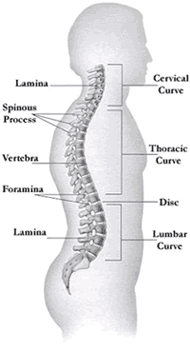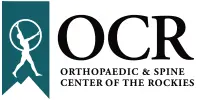Our spine specialists, Robert Benz, MD, William Biggs, MD, and Matthew Gerlach, MD have years of experience, board certification, specialized (fellowship) training, and expertise in helping people with back and neck injuries and conditions.
They have patient appointments in both our Fort Collins, Loveland, and Greeley, CO offices.
Spondylolisthesis
 A slippage of one vertebra over the one below it, most commonly in the lumbar (lower back) area. It may develop in a weakened area of the vertebra during childhood or the adolescent years, or it could occur later in life as a result of degeneration.
A slippage of one vertebra over the one below it, most commonly in the lumbar (lower back) area. It may develop in a weakened area of the vertebra during childhood or the adolescent years, or it could occur later in life as a result of degeneration.
Other causes include: heredity (your family history or genetics) or a stress fracture in a vertebra.
Spinal Stenosis
Narrowing of the spinal canal, nerve root channel, and/or intervertebral foramen. Spinal stenosis may be inherited, but most often it is caused by the normal aging process.
Sciatica
Pain radiating from the back and down the leg.
Ruptured Disc/Bulging Disc/”Slipped Disc”
Age or injury may cause discs to dry out or degenerate.
As this happens, the jelly-like nucleus in the disc may bulge into the annulus, causing pain and pressure. If a sudden movement or injury causes a rupture of the annulus (torn annulus), the nucleus squeezes out and irritates the nearby nerves.
Radiculopathy
Most often referred to as a pinched nerve; it may cause pain in the upper extremities, thorax, or legs.
Spinal Instability
As a disc degenerates and flattens, vertebrae may become unstable, slipping back and forth and irritating facet joints and nerves.
Degenerative Disc Disease
Over the human life span, the discs naturally wear out.
Sports, injury and everyday activities contribute to the degeneration of the discs.
Scoliosis
This sideways curvature of the spine causes it to resemble a letter “S” or “C” rather than a straight “I”.
Scoliosis can occur at any age in children or teen-agers. It can run in families, but in many cases its cause is not known.
Read More
Learn about lumbar, thoracic, and cervical anatomy at Spine-health.com
Read all about back-neck conditions, treatments at the AAOS Patient Information website
